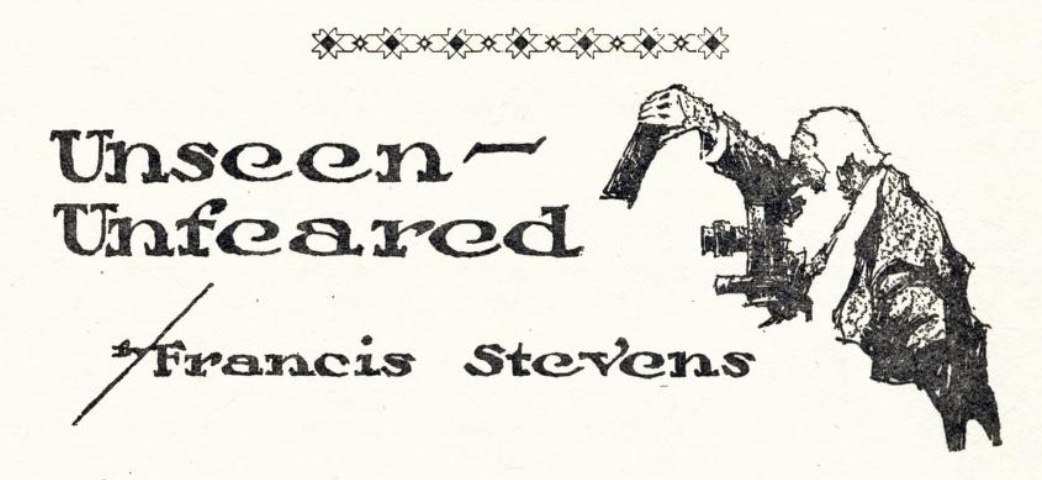UNSEEN — UNFEARED (1)
By:
July 9, 2023

“Unseen — Unfeared” was originally published in the February 10, 1919 edition of People’s Favorite Magazine. HiLoBooks is pleased to serialize it here for HILOBROW’s readers.
ALL INSTALLMENTS: 1 | 2 | 3 | 4 | 5 | 6 | 7 | 8 | 9 | 10.
I had been dining with my ever-interesting friend, Mark Jenkins, at a little Italian restaurant near South Street. It was a chance meeting. Jenkins is too busy, usually, to make dinner engagements. Over our highly seasoned food and sour, thin, red wine, he spoke of little odd incidents and adventures of his profession. Nothing very vital or important, of course. Jenkins is not the sort of detective who first detects and then pours the egotistical and revealing details of achievement in the ears of every acquaintance, however appreciative.
But when I spoke of something I had seen in the morning papers, he laughed. “Poor old ‘Doc’ Holt! Fascinating old codger, to any one who really knows him. I’ve had his friendship for years—since I was first on the city force and saved a young assistant of his from jail on a false charge. And they had to drag him into the poisoning of this young sport, Ralph Peeler!”
“Why are you so sure he couldn’t have been implicated?” I asked.
But Jenkins only shook his head, with a quiet smile. “I have reasons for believing otherwise,” was all I could get out of him on that score. “But,” he added, “the only reason he was suspected at all is the superstitious dread of these ignorant people around him. Can’t see why he lives in such a place. I know for a fact he doesn’t have to. Doc’s got money of his own. He’s an amateur chemist and dabbler in different sorts of research work, and I suspect he’s been guilty of ‘showing off.’ Result, they all swear he has the evil eye and holds forbidden communion with invisible powers. Smoke?”
Jenkins offered me one of his invariably good cigars, which I accepted, saying thoughtfully: “A man has no right to trifle with the superstitions of ignorant people. Sooner or later, it spells trouble.”
“Did in his case. They swore up and down that he sold love charms openly and poisons secretly, and that, together with his living so near to—somebody else—got him temporarily suspected. But my tongue’s running away with me, as usual!”
“As usual,” I retorted impatiently, “you open up with all the frankness of a Chinese diplomat.”
He beamed upon me engagingly and rose from the table, with a glance at his watch. “Sorry to leave you, Blaisdell, but I have to meet Jimmy Brennan in ten minutes.”
He so clearly did not invite my further company that I remained seated for a little while after his departure; then took my own way homeward. Those streets always held for me a certain fascination, particularly at night. They are so unlike the rest of the city, so foreign in appearance, with their little shabby stores, always open until late evening, their unbelievably cheap goods, displayed as much outside the shops as in them, hung on the fronts and laid out on tables by the curb and in the street itself. To-night, however, neither people nor stores in any sense appealed to me. The mixture of Italians, Jews and a few negroes, mostly bareheaded, unkempt and generally unhygienic in appearance, struck me as merely revolting. They were all humans, and I, too, was human. Some way I did not like the idea.
RADIUM AGE PROTO-SF: “Radium Age” is Josh Glenn’s name for the nascent sf genre’s c. 1900–1935 era, a period which saw the discovery of radioactivity, i.e., the revelation that matter itself is constantly in movement — a fitting metaphor for the first decades of the 20th century, during which old scientific, religious, political, and social certainties were shattered. More info here.
SERIALIZED BY HILOBOOKS: James Parker’s Cocky the Fox | Annalee Newitz’s “The Great Oxygen Race” | Matthew Battles’s “Imago” | & many more original and reissued novels and stories.
